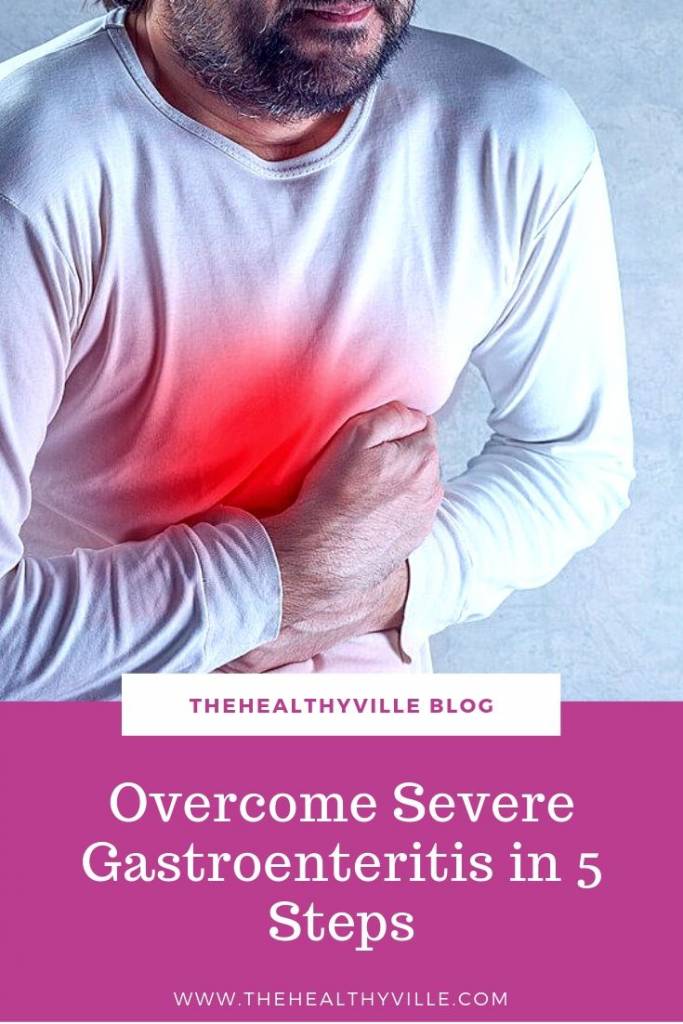Severe gastroenteritis occurs due to an overgrowth of bacteria in the intestine. It is not usually serious and you can cope with it at home with some basic care.
Bacterial gastroenteritis is a digestive disease that develops from an inflammation of the stomach and intestines. It happens when some pathogenic bacteria get to proliferate in the intestine, giving rise to an infection. Do you know how to overcome severe gastroenteritis?
The infection is transmitted easily from person to person or through contact with contaminated objects or food. In addition, it is common in areas where water is not treated properly. What are your symptoms? How can it be overcome naturally? Discover it!
Symptoms of bacterial gastroenteritis
The symptoms of bacterial gastroenteritis may vary depending on the type of bacteria that causes the infection. These may include: Staphylococcus, Salmonella and E. coli. In general, the clinical manifestations of this condition include:
- Lack of appetite
- Nausea and vomiting
- Diarrhea
- Pain and abdominal cramps
- Moderate fever
- Blood in the stool
Further info: MRSA (Methicillin-Resistant Staphylococcus Aureus): Everything You Need To Know About This “Superbacteria”
How to overcome severe gastroenteritis in 5 steps?
To overcome bacterial gastroenteritis, it is necessary to put into practice a series of tips to accelerate the relief of symptoms. The most serious cases must be treated by a doctor, as it may be necessary to administer fluids and salts intravenously and the use of antibiotics. The steps to control it at home are:
-
Increase the consumption of liquids
In cases of gastroenteritis, hydration should be constant and, if possible, by oral rehydration serums.
Increase the consumption of water and healthy liquids is crucial to overcome bacterial gastroenteritis, especially after suffering episodes of diarrhea. Although many ignore it, the infection leads to dehydration symptoms that increase the risk of complications.
What should you do?
- Drink a lot of water.
- If you can, prepare rice water and consume it after having diarrhea.
- Other healthy options can be: some infusions, broths or oral rehydration serums with electrolytes.
-
Eat little to overcome severe gastroenteritis
Overloading the digestive system with a heavy diet is not the best alternative to cope with this infection. Since there are alterations in digestion, in addition to pain and inflammation, it is best to eat little and often.
What should you do?
- Start by making a light diet, based on broths and isotonic drinks.
- Then, little by little introduce astringent foods and low in fiber, in order to regulate intestinal functioning. If the evolution is favorable, you can take foods such as: rice cakes, cooked white rice, potato and carrot, cooked ham, fish and chicken breast.
-
Avoid self-medication
The consultation with your health specialist will help you apply the most appropriate treatment.
There is a wide variety of medications that can help treat discomfort such as abdominal pain, diarrhea and nausea. However, although some are over-the-counter, they should not be taken without medical supervision. Sometimes, these can make the discomfort worse.
What should you do?
- If you have severe or persistent symptoms, ask the doctor which drugs can help control them.
- It completely avoids the use of antibiotics, because they should only be administered in severe cases.
-
Wash your hands constantly
Bacterial gastroenteritis can spread easily when there is no good hygiene. Therefore, to avoid infecting other people, it is essential to wash your hands constantly, especially after going to the bathroom or after changing diapers.
What should you do?
- Wash your hands with water and antibacterial soap for at least 15 seconds.
- If you cannot wash your hands, use an antibacterial gel.
- Be sure to repeat this action before handling food or having any contact with other people.
-
Clean food well
The food must be cleaned correctly before cooking to avoid possible food poisoning.
Proper food handling is key to overcoming bacterial gastroenteritis. In fact, many cases of this infection are the result of food contamination. Therefore, we must pay close attention to delicate foods such as meats or those that are served raw.
What should you do?
- Wash your hands thoroughly before handling food. If you have the infection, avoid cooking.
- Wash and disinfect all fruits and vegetables that are consumed raw.
- Make sure you cook meats and fish well.
- Pay close attention to the handling of other foods such as dairy and eggs.
Conclusion
Keep in mind that the symptoms of bacterial gastroenteritis usually go away by themselves after three or four days, and some cases last up to two weeks. If after this time there is no improvement, you should consult the doctor. You should also seek immediate help in case of prolonged diarrhea, high fever or bleeding.
Don’t forget to SHARE the severe gastroenteritis symptoms and treatment options with your friends and family on your social networks!

